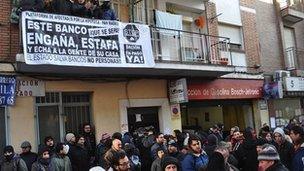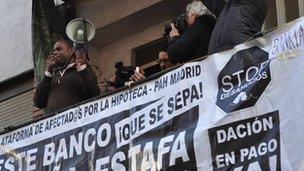Spain protest movement fights housing evictions
- Published
As Tom Burridge reports from Madrid, a protest movement is running a nationwide campaign to stop the evictions
As the pain of Spain's property crash continues to hit people hard, a nationwide movement is now fighting back.
Regular protests are being staged as banks repossess the homes of those who cannot afford loans taken out when the economic outlook was more rosy.
Young Spanish couples and immigrants are the two groups worst affected. Spanish Economy Minister Luis de Guindos recently announced that the government would hold talks with Spain's banks to try and find ways to lessen the impact of the repossessions.
Housing 'a right not a luxury'
On the morning that the banks were due to take control of Ronale de la Cruz's house, more than 150 people turned up to stop the eviction.

Protesters at Ronale de la Cruz's house on the day it was to be repossessed
"Having a house is not a luxury good, it's a basic right," said the 48-year-old immigrant from the Dominican Republic, who bought the house in 2004 and lives there with his wife and four children.
"I'm one of many," he tells me.
"If the bank decides today to give me social housing, it doesn't solve anything. It's a problem that's affecting more and more people."
Protesters crowded around the front door as several police vans and cars arrived to enforce the repossession order on behalf of Ronale's bank.
Tatyana Roeva was one of the protesters who went to the house the night before the eviction.

Protester Tatyana Roeva says people were "tricked" into taking out loans
"Surely someone who enters into a mortgage has a duty to meet their payments?" I ask her.
"I don't agree, because we were tricked. They created a property bubble and they gave mortgages to everyone. It was a fraud in every sense of the word."
Bankers' defence
Savings banks, known in Spanish as "cajas", issue more than half the total value of mortgages in Spain.
One of the biggest problems for the savings banks is the amount of property they own. Many of them are now referred to as "bad assets" because their value has fallen so sharply.
However the Confederation of Spanish Savings Banks (CECA) rejects the notion that, prior to 2008, its members were guilty of irresponsible lending.
"I think we should take into account the climate in which lending contracts were issued," said Antonio Romero from the CECA.
"They took place at the peak of the cycle in the Spanish economy, when credit was easy to get and when the unemployment rate was really low."
Since Spain's economic boom came to a resounding end at the beginning of 2008, banks have repossessed more than 150,000 properties.
The latest figures from Spain's legal authorities show that in the third quarter of 2011, there were 10,869 properties repossessed in Spain. In the previous quarter, that figure peaked at 16,464.
But according to the CECA, 97.5% of people with mortgages in Spain are currently meeting their payments. It argues this shows that the property portfolio of Spanish savings banks is, on the whole, healthy.
Protesters win concessions
The protesters had been camped outside Ronale de la Cruz's house for several hours when he was called, along with his lawyer, to a meeting with an official from his local authority and a representative from his bank.

Ronale de la Cruz says he is one of many fighting repossession
The four men stood, surrounded by the media and the police on the main road near Ronale's house, after the bank had agreed to suspend his eviction for a further eight days.
Irene Montero, 24, was one of the protesters celebrating as Ronale de la Cruz returned to his home with his fists punching the air. She described the number of empty properties and housing repossessions in Spain as "inhumane".
"At the very least we want things changed, so that when someone's house is repossessed they don't still owe the bank money," she said.
However, in Spain, people can buy into certain types of mortgages where the debt is wiped out if the property is repossessed.
As Antonio Romero explained, the problem is that the rates on those mortgages are much higher and so very few people buy them.
- Published27 January 2012
- Published27 January 2012